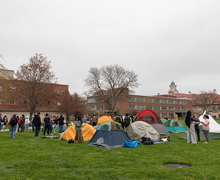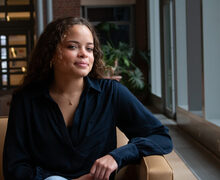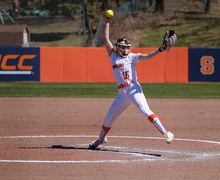Rally highlights impacts of Israel-Hamas war on children
Cassandra Roshu | Photo Editor
Nimar Saada, age 12, speaks at a “Children and Community for a Ceasefire” rally. Nimar did not know that he would be given the role until a few minutes after the rally began, his mother Leylah Shukri said.
Get the latest Syracuse news delivered right to your inbox.
Subscribe to our newsletter here.
More than 100 community members gathered in front of Syracuse City Hall Sunday afternoon for a “Children and Community for a Ceasefire” rally centered around how the Israel-Hamas war impacts children.
The ‘Cuse Ceasefire Coalition hosted the child-friendly demonstration, which featured two youth speakers and kites for attendees to fly, a day before the Syracuse City Common Council votes on a resolution in support of a ceasefire in the war in Gaza. The children, along with seven other adult speakers, took turns speaking into a microphone on the City Hall’s front steps.
“I support a ceasefire because Palestinian children’s limbs belong attached to their bodies with their hearts beating inside of their chests. Food belongs inside of their empty bellies,” said Angie Coronel, a Syracuse University student who spoke at the rally. “Every single Palestinian child killed by Israel was someone’s everything — the soul of their soul.”
The Israel-Hamas war began six months ago as of Sunday. Since Oct. 7, Israel’s military has killed more than 13,000 Palestinian children in Gaza, according to a March 17 statement from the United Nations International Children’s Emergency Fund. In total, Israel’s response has killed more than 33,000 Palestinians, according to Gaza’s Ministry of Health.
Dana Olwan, an associate professor of Women’s and Gender Studies at SU, helped coordinate the event as part of the CCC.
“It is really important to understand that these kinds of violences have a very serious consequence on Palestinian children, on their right to have a life, on their right to be children,” Olwan said. “Children are not shielded from historical situations, and it’s really important that they be present and that their voices and experiences are valued and appreciated.”
Nimar Saada, a 12-year-old Palestinian-American, was born in Ohio but grew up in Syracuse. He said he goes to Palestine every summer, but that his family experiences “checkpoints, settler harassment and restriction … because we’re Palestinian.”
“Since when do we see such segregation in 2024? How is this fair? Why? Why do we have to see children dying every day? Why do we have to eat and feel guilty that people in Gaza are starving to death?” he said.
Kites flown by attendees were adorned with poetry by Refaat Alareer, a Palestinian poet who was killed in Gaza and worked to organize the “We are Not Numbers” campaign. “If I must die, let it bring hope,” the kites read, among other excerpts from Alareer’s work.
“The kite symbolizes freedom. It’s also to bring attention to the loss of childhood, the loss of innocence,” Olwan said. “They symbolize the right to move, travel, all those things that are central to the Palestinian struggle … that actually, the Israeli occupation deprives Palestinian children from.”

Cassandra Roshu | Photo Editor
Attendees hold kites provided by event organizers, all of which were adorned with poetry by Refaat Alareer, a Palestinian poet who was killed in Gaza and who had been working to organize the “We are Not Numbers” campaign.
Amirah Mohammad, a teenager and student in the Syracuse City School District, told the crowd filled with Palestinian flags and kites that she comes from a lineage of internally and externally displaced Palestinian refugees. According to the event’s moderator, Mohammad recently led a walkout at her school.
“We cannot let fear be our downfall. We must let fear be our enemy and we must destroy the enemy,” she said. “We need to stop giving into Israeli tactics. Six months have passed. Six whole months. We’re beyond asking for a ceasefire. I ask for liberation.”
Mohammad said one in three Palestinians are estimated to have no home to return to and that many surviving children have no surviving family. Yet, she said, these statistics are “not convincing the Syracuse Council to vote yes on the ceasefire.”
Laura Jaffee, a member of the Syracuse chapter of Jewish Voice for Peace, said she wrote an email last week to the Common Council urging councilors to vote in support of the ceasefire resolution. She recited her email to the crowd.
“Calling for an end to genocide should be an easy choice. I also understand the silencing effect of the widespread — though insidious and false — claim that condemning Israel’s violence and calling for a ceasefire is antisemitic. This could not be further from the truth,” she said.
Jaffee said many of her ancestors were killed in the Holocaust.
“Today, I cannot look at the endless stream of images of children’s faces emaciated by man-made famine, the mass graves, the executions, the callous ridding of land of inhabitants to expand the borders of an ethnic state, and the number of bodies — without recalling my own history and memory as a Jew,” she said.
Olivia, another member of JVP Syracuse who did not share her last name, said she is the granddaughter of Holocaust survivors. She emphasized that the war is “not a religious conflict,” but rather a moral issue “about saving lives.”
Olivia said that the Israeli and American governments “try to wield the pain of our Jewish community, saying ‘this war will make Jews safer.’”
“Bombing, killing, massacring will not make anyone anywhere safer and it will also not bring back any hostages. It only further endangers them,” Olivia said.
In a Thursday phone call, President Joe Biden told Israeli Prime Minister Benjamin Netanyahu that an immediate ceasefire in exchange for the estimated 100 hostages held in Gaza was “essential.”
In a cabinet meeting Sunday, Netanyahu said a ceasefire “just won’t happen” without the return of hostages, Al Jazeera reported. An estimated 40 children were abducted as hostages in Hamas’ Oct. 7 attack on Israel that killed around 1,200 people — at least 33 of which were children, according to the U.N. Office for the Coordination of Human Affairs.
Jaffee emphasized that the Israel-Hamas war is a local issue, as the council’s constituents — especially those that are Palestinian, Arab and Muslim — are impacted by “watching genocide live-streamed,” Jaffee said.
“Our world is too connected to draw false borders futilely demarcating local from international issues,” she said. “It’s a local issue because your constituents have been rallying, protesting, holding teach-ins, calling, sitting in and writing for a free Palestine for the past six months.”

Cassandra Roshu | Photo Editor
Lilyann Saada, age 6, writes “I am not hape” in chalk on the pavement in front of City Hall, where the rally was held. City hall was surrounded by supporters of all ages decorating kites, flying them and painting flags on each other’s cheeks.
If the council passes the resolution, Syracuse will join the at least 100 cities and localities — including Albany and Ithaca — across the U.S. that have passed ceasefire resolutions.
Biko Gray, associate professor of religion at SU and a speaker at the event, said the council should’ve already passed the ceasefire resolution because Syracuse is “full of people who are directly affected by international struggles.”
“We live here, we eat here, we pay taxes here and we will not stand for complicity as it relates to violence here and abroad,” he said. “Let me be very clear about this: as far as I am concerned, I do not want my taxpayer dollars paying for the deaths of people with whom I am in solidarity.”
Over 950 people have signed the coalition’s online petition in support of the ceasefire resolution since it was published to Change.org on March 29. CCC urged rally attendees to “pack the chambers” during the council’s meeting Monday.
“We need to all demand a ceasefire from Syracuse, New York, to stop the killing of innocent human beings,” 12-year-old Saada said.
Published on April 7, 2024 at 11:44 pm
Contact Ahna: arflemin@syr.edu





